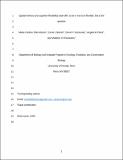Spatial memory and cognitive flexibility trade-offs : to be or not to be flexible, that is the question
Abstract
Cognitive flexibility allows animals to readily acquire new information even when learning contingencies may rapidly change, as is the case in highly variable, but predictable, environments. While cognitive flexibility is broadly thought to be beneficial, animals exhibit inter- and intraspecific variation, with higher levels of flexibility associated with reduced memory retention and vice versa. In this review, we discuss when and why such variation may exist and focus specifically on memory and memory flexibility. We argue that retained memories may negatively affect the acquisition of new information, most likely via proactive interference, and available data suggest that there may be a trade-off between memory retention and acquiring new memories. We discuss neurogenesis-mediated forgetting as the mechanism reducing memory interference, as new neurons enhance learning new information but also cause forgetting of older memories. Selection may be expected to favour either end of the continuum between memory retention and memory flexibility depending on life history and environment. More stable environments may favour memory retention over flexibility whereas rapidly changing environments may favour flexibility over retention. Higher memory capacity also seems to be associated with higher memory interference, so higher neurogenesis rates associated with forgetting of unnecessary information may be favoured when higher capacity is beneficial such as in food-caching species. More research is necessary to understand whether inter- and intraspecific differences in the association between memory retention and flexibility are related to some general ecological patterns, whether this association is heritable, and whether developmental conditions and experience have different effects on this association in different species.
Citation
Tello Ramos , M C , Branch , C L , Kozlovsky , D Y , Pitera , A M & Pravosudov , V V 2018 , ' Spatial memory and cognitive flexibility trade-offs : to be or not to be flexible, that is the question ' , Animal Behaviour , vol. In press , 7 . https://doi.org/10.1016/j.anbehav.2018.02.019
Publication
Animal Behaviour
Status
Peer reviewed
ISSN
0003-3472Type
Journal article
Description
All authors were supported by National Science Foundation (NSF) grant IOS1351295 to V.V.P., and C.L.B. was supported by NSF grant DDIG 1600845.Collections
Items in the St Andrews Research Repository are protected by copyright, with all rights reserved, unless otherwise indicated.

